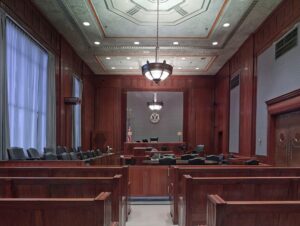Reed
O’Connor
There
are
a
lot
of
reasons
to
reject
the
plea
deal
hammered
out
between
the
Department
of
Justice
and
Boeing.
The
investigation
into
Boeing’s
multiple
737
Max
crashes
—
the
apparent
result
of
failings
that
occurred
after
it
agreed
to
a
deferred
prosecution
agreement
in
exchange
for
a
pledge
to
clean
up
its
act
—
set
the
stage
for
a
damning
trial
that
could’ve
delivered
huge
awards
for
the
victims’
families.
But
instead,
the
DOJ
agreed
to
a
$230-some-odd
million
fine
and
a
pledge
to
allow
an
independent
monitor
keep
Boeing
in
compliance.
So
a
judge
might
have
rejected
this
agreement
as
a
disgraceful
sweetheart
deal.
But
Judge
Reed
O’Connor
is
not
a
typical
judge,
so
he
rejected
the
deal
because
the
parties
agreed
not
to
engage
in
discrimination
when
choosing
the
independent
monitor.
The
oft-reversed
Republican
judge
has
tried
to strike
down
Obamacare
(reversed),
strike
down
other parts of
Obamacare
(reversed),
strike
down
the
Indian
Child
Welfare
Act
(reversed),
invent
a
constitutional
right
for
crybaby
anti-vaxxers —
and,
well,
you’re
not
going
to
believe
this,
but
he
got reversed.
Now
he’s
hearing
the
Boeing
case
and
settled
upon
the
dumbest
possible
reason
to
reject
the
deal.
The
plea
agreement
provides
that
the
retention
of
an
independent
compliance
monitor
is
a
special
condition
of
probation,
meaning
if
Boeing
fails
to
retain
the
monitor,
it
will
violate
its
probation.
But
the
plea
agreement
prohibits
imposing
as
a
condition
of
probation
a
requirement
for
Boeing
to
comply
with
the
monitor’s
anti-fraud
recommendations.
Additionally,
the
independent
monitor
is
selected
by
and
reports
to
the
Government,
not
the
Court.
Moreover,
Boeing
will
have
the
opportunity
to
prevent
the
hiring
of
one
of
the
six
monitor
candidates
chosen
by
the
Government.
And
finally,
the
Government
will
select
the
independent
monitor
“in
keeping
with
the
Department’s
commitment
to
diversity
and
inclusion.”
(Relevant
language
in
bold)
Note
that
this
agreement
does
not
say
that
the
DOJ
will
actually
hire
a
diversity-enhancing
candidate
for
this
job
or
even
that
it
will
employ
some
sort
of
affirmative
action
policy.
It’s
just
the
standard
boilerplate
used
by
entities
both
public
and
private
to
say,
“Hey,
we’re
not
going
to
discriminate.”
By
way
of
confirmation,
one
need
look
no
further
than
the
fact
that
—
in
living
by
this
vague
pledge
—
the
Department
of
Justice
includes
a
whole
lot
of
white
guys.
Specifically,
the
DOJ
is
around
40%
women
and
67%
white.
But
research
is
hard
when
you’re
more
interested
in
putting
out
a
Townhall
article
than
a
considered
legal
opinion.
O’Connor
notes
that
existing
law
prohibits
discrimination
ipso
facto
including
these
words
in
contract
MUST
signal
something
beyond
the
strictures
of
the
law.
This
is
not
how
agreements
work
in
the
real
world,
but
let’s
let
him
cook
for
a
second.
Critically
though,
the
plea
agreement
does
not
define
the
terms
“diversity”
and
“inclusion.”
For
that,
the
Government
directs
the
Court
to
a
2021
Executive
Order
to
clarify
the
meaning
of
these
terms.
The
stated
purpose
of
this
Executive
Order
was
to
“further
advance
equity
within
the
Federal
Government”
and
“cultivate
a
workforce
that
draws
from
the
full
diversity
of
the
Nation.”
The
Executive
Order
defined
“diversity”
as
“the
practice
of
including
the
many
communities,
identities,
races,
ethnicities,
backgrounds,
abilities,
cultures,
and
beliefs
of
the
American
people,
including
underserved
communities.”
Similarly,
“‘inclusion’
means
the
recognition,
appreciation,
and
use
of
the
talents
and
skills
of
employees
of
all
backgrounds.”
These
quotes
are
taken
from
the
general
summary
and
definitions
section
of
Executive
Order
14035.
O’Connor
uses
this
language
to
give
the
impression
that
the
federal
government
is
willy-nilly
stacking
the
workforce
with
women
and
minorities.
But
definitions
hold
little
probative
weight
outside
of
their
contextual
usage,
and
the
order
commits
the
government
to
adhere
to
“merit
system
principles”
first
and
foremost
while
vaguely
promising
to
find
strategies
to
increase
diversity
and
inclusion.
It
does
not
commit
to
race-based
“hiring”
except
to
the
extent
someone
with
a
diverse
background
interviewing
for
the
job
that
otherwise
might
not
have
ends
up
winning
the
position
on
the
merits.
While
the
Government
assures
the
Court
that
the
Government
will
consider
all
possible
monitors
(i.e.,
all
backgrounds,
etc.)
but
will
choose
a
monitor
solely
based
on
merit
and
talent,
the
Court
is
skeptical
of
this
assertion.
This
is
just
an
astounding
sentence.
It
rests
on
the
premise
that
there’s
a
fundamental
disconnect
between
considering
women
and
minorities
for
a
job
and
merit.
It’s
not
the
quiet
part
out
loud,
but
it’s
certainly
the
quiet
part
pushed
to
a
distractingly
loud
whisper.
Despite
the
Government’s
efforts
to
divorce
the
Executive
Order
from
the
plea
agreement,
the
Court
is
not
convinced
in
light
of
the
foregoing
that
the
Government
will
not
choose
a
monitor
without
race-based
considerations
and
thus
will
not
act
in
a
nondiscriminatory
manner.
He’s
not
convinced
that
they
will
not.
Stop
for
a
second
and
consider
how
one
proves
this
negative.
There’s
no
consistent
method
of
complying
with
his
new
standard
other
than
making
sure
only
straight
white
dudes
are
considered.
Because
if
you
think
this
opinion
would
be
different
if
the
DOJ
showed
up
with
a
bunch
of
minority
candidates
but
had
just
avoided
ever
saying
“diversity”
or
“inclusion”
out
loud…
you
must
have
a
lot
of
trouble
with
the
wallet
inspector.
And
he’s
not
happy
about
Boeing’s
generic
diversity
policies
either
and
cites
them
as
a
compounding
feature:
Accordingly,
based
on
Boeing’s
supplemental
briefing
and
its
policies,
the
Court
is
concerned
Boeing
will
exercise
its
strike
of
one
of
the
Government’s
six
chosen
monitor
candidates
in
a
discriminatory
manner
and
with
racial
considerations.
The
purest
conservative
argument
against
affirmative
action
is
that
it
impairs
freedom
to
contract.
If
a
private
party
wants
to
hire
only
white
people
—
the
Goldwater-Reagan
foot
soldiers
argued
—
that
may
be
unfortunate,
but
it’s
their
right
as
Americans!
In
fact,
Judge
O’Connor
sees
it
this
way
when
an
employer
discriminates
against
LGBTQ+
employees
because
employers
are
free
“to
regulate
the
sexual
conduct
of
their
employees…
including
sodomy,
premarital
sex,
adultery,
and
any
other
kind
of
sexual
activity
that
occurs
outside
the
context
of
a
marriage
between
a
man
and
a
woman.”
But
in
this
case,
the
contractual
artifice
crumbles.
Boeing,
as
a
sophisticated
private
entity
represented
by
competent
counsel,
cannot
be
trusted
to
enter
a
contract
if
there’s
any
chance
that
it
might
not
hire
a
white
guy
to
do
this
job.
It’s
an
inescapable
loop:
it’s
wrong
to
stop
private
companies
from
hiring
straight
white
guys
if
that’s
what
they
want…
but
also
it’s
wrong
to
allow
companies
the
freedom
to
hire
a
women
or
minority
if
that’s
what
they
want.
Remember,
he
could’ve
gotten
the
same
result
by
rejecting
the
deal
as
unfair
to
the
victims
and
instead
contrived
this
strained
reading
of
diversity
and
inclusion.
Which
makes
statements
from
the
families
so
much
more
tragic:
Ike
and
Susan
Riffel
of
California
who
lost
their
two
sons
Melvin
and
Bennett,
reacted
to
the
judge’s
opinion:
“The
judge
did
the
right
thing
throwing
this
terrible
plea
deal
out.
This
plea
deal
was
nothing
more
than
a
get
out
of
jail
free
card
for
Boeing.
This
deal
didn’t
hold
anyone
accountable
for
the
deaths
of
346
people
and
did
nothing
to
protect
the
flying
public.
I’m
very
happy
with
Judge
O’Connor’s
decision
and
now
we
can
move
forward
with
real
justice
for
our
loved ones.
This
is
another
step
forward
in
holding
the
people
accountable
for
the
deaths
of
346
people.”
Will
the
ultimate
deal
result
in
a
better
outcome
for
the
victims’
families?
Hard
to
imagine
when
he
couldn’t
be
bothered
to
make
these
deficiencies
a
feature
of
this
order.
He
seems
entirely
on
board
with
the
woefully
insufficient
award
as
long
as
the
monitor
isn’t
a
diversity
hire.
Almost
like
he
doesn’t
care
about
the
victims
as
much
as
he
cares
about
generating
a
headline…
Earlier:
Judge
Reed
O’Connor
Seems
To
Own
Too
Much
Tesla
To
Rule
Against
CVS,
Just
Enough
To
Rule
Against
Liberal
Fact-Checkers
Media
Matters
Isn’t
Saying
Judge
Reed
O’Connor
Is
Conflicted.
They’re
Just
Saying
That
He
Stands
To
Financially
Benefit
From
Twitter
SLAPP
Suit.
Elon
Musk
Says
Advertisers
Are
Doing
The
RICO
If
They
Don’t
Give
Him
Money
 Joe
Joe
Patrice is
a
senior
editor
at
Above
the
Law
and
co-host
of
Thinking
Like
A
Lawyer.
Feel
free
to email
any
tips,
questions,
or
comments.
Follow
him
on Twitter or
Bluesky
if
you’re
interested
in
law,
politics,
and
a
healthy
dose
of
college
sports
news.
Joe
also
serves
as
a
Managing
Director
at
RPN
Executive
Search.



 Lisa
Lisa












